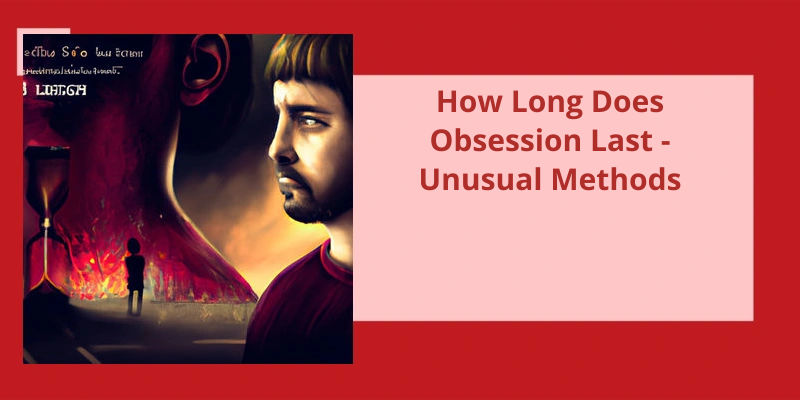We often find ourselves wondering how long these intense fixations can last and if there are any unconventional methods to breaking free from their grip. In this exploration of the peculiar methods utilized to surpass obsession, we delve into unorthodox approaches that have been used throughout history to release oneself from the clutches of relentless infatuation. From ancient rituals to modern psychological techniques, these lesser-known methods offer a unique perspective on the perpetual question of how long obsession truly lasts.
How Long Does It Take for Obsession to End?
This is why it’s crucial to break the cycle and implement some unusual methods in order to expedite the process of ending an obsession. One such method is to completely cut off all contact with the person or thing that’s the object of obsession. This means deleting their number, unfollowing them on social media, and avoiding places where they might be present. By creating physical and emotional distance, the brain is given the opportunity to slowly wean itself off the need for that constant love chemical high.
Another method is to redirect the obsessive thoughts and emotions towards healthier outlets. Engaging in activities that bring joy or fulfillment can help break the cycle of obsession and provide a sense of purpose. This can be anything from taking up a new hobby to volunteering for a cause that holds personal significance. By focusing on personal growth and positive experiences, the brain can slowly rewire itself to find satisfaction elsewhere.
Therapists can provide guidance and support in navigating the complex emotions and thought patterns associated with obsession. They can also offer coping mechanisms and techniques to help manage and ultimately overcome the obsession. It’s important to remember that healing takes time, and there’s no one-size-fits-all solution. However, with proper guidance and a willingness to explore unconventional methods, it’s possible to break free from the chains of obsession.
Many individuals have experienced peculiar obsessions at some point in their lives, wondering why certain thoughts or behaviors consume their minds. Experts suggest that these peculiar fixations may stem from chemical variations within the brain or be triggered by environmental factors, particularly during times of intense stress. Understanding the underlying causes of such obsessions can help shed light on the intricate workings of our thoughts and emotions.
Why Do I Get Weird Obsessions?
Have you ever found yourself fixated on a particular thought or idea that seems to consume your every waking moment? Perhaps youve experienced these weird obsessions and have wondered why they occur. Well, youre not alone. Many people encounter strange and intrusive thoughts that stubbornly refuse to leave their minds.
Research suggests that certain neurotransmitters, such as serotonin, play a crucial role in regulating mood and thought patterns. It’s believed that imbalances or irregularities in these neurotransmitters might make some individuals more prone to developing obsessions. For instance, people with obsessive-compulsive disorder (OCD) often have imbalances in neurotransmitters like serotonin, leading to repetitive and intrusive thoughts.
In addition to chemical differences, environmental factors can also contribute to the emergence of obsessions. High levels of stress, for example, can trigger or exacerbate these intrusive thoughts. When youre under immense pressure or facing a particularly challenging situation, your mind may try to make sense of it all by fixating on a specific idea or thought. This fixation can escalate into an obsession, as your brain struggles to find a solution or resolution.
Moreover, traumatic events or past experiences can also leave a lasting impact on the mind, fostering the development of obsessions. These events can create deep emotional scars and trigger a hyper-focused response in the brain. In an attempt to make sense of the trauma or avoid a similar situation, the mind may become fixated on specific thoughts or behaviors. These obsessions can provide a false sense of control or security, serving as a coping mechanism for the individual.
Therefore, understanding the underlying causes may require a comprehensive approach, considering both biological and environmental factors. By recognizing these influences, individuals can seek appropriate help and intervention to manage their obsessions effectively and improve their overall well-being.
The Role of Genetics in the Development of Obsessions
Genetics plays a significant role in the development of obsessions. Research suggests that certain genes may increase an individual’s susceptibility to developing obsessive-compulsive disorder (OCD) or other types of obsessions. These genes are involved in the regulation of brain chemicals, such as serotonin, which is known to play a role in mood and anxiety disorders.
However, it’s important to note that genetics isn’t the sole determining factor in the development of obsessions. Environmental and psychological factors also contribute to the development of this condition. Factors such as childhood experiences, trauma, and learned behaviors can all contribute to the development and persistence of obsessions.
Overall, while genetics may increase the likelihood of developing obsessions, it’s a complex interplay of various factors that ultimately determine the duration and intensity of an individual’s obsession.
By stepping away from your obsession for a designated period, you can gain valuable perspective and discover alternative avenues of interest. In this article, we will delve into effective strategies that can assist you in breaking free from weird obsessions and fostering a more balanced and fulfilling lifestyle.
How Do I Stop Weird Obsessions?
Obsessions can be consuming and sometimes even bizarre, leading us down paths that we never thought we’d venture into. However, there are effective ways to redirect our attention and break free from these unusual fixations. One method is to simply take a break from engaging with the object of your obsession. Set aside a day or even a whole week to purposely not indulge in your obsession. Treat it as an experiment to see what else captures your attention.
During this break, pay close attention to how you spend your time and what piques your interest. Notice the new experiences you’ve and the different activities you engage in. You may find that there are countless other subjects or hobbies that captivate you, allowing you to experience new joys and pleasures. This break serves as a reminder that life is full of various possibilities, and by exploring them, you open yourself up to a whole world of opportunities.
Moreover, this time away from your obsession allows you to gain perspective. You may discover that your obsession was taking up more mental and emotional energy than you realized. Stepping back allows you to assess whether the time and effort you were investing in this fixation were truly beneficial or if they were preventing you from fully experiencing other aspects of life. It can provide you with a clearer picture of the impact your obsession has on your overall well-being.
Taking a break also offers you the opportunity to reflect on why the obsession began in the first place. Sometimes, unusual fixations can stem from underlying emotional needs or desires. By distancing yourself from the obsession, you can gain insight into what it was providing you and explore healthier ways to fulfill those needs. This introspection may help you uncover deeper motivations behind your fixation and find alternative paths to satisfaction.
Mental illness can manifest in various forms, and one specific condition linked to obsession is Obsessive-Compulsive Disorder (OCD). This disorder is characterized by the presence of unwanted thoughts, known as obsessions, which lead to repetitive behaviors or compulsions. Individuals with OCD find it difficult to control or dismiss their intrusive thoughts, often resulting in overwhelming anxiety and distress. In this article, we will explore the different aspects of OCD, including it’s symptoms, causes, and available treatment options.
What Mental Illness Is Linked to Obsession?
Obsessive-Compulsive Disorder (OCD) is a mental illness that’s often linked to obsession. It’s a condition characterized by uncontrollable thoughts and repetitive behaviors that can significantly interfere with a persons daily life. These obsessions can manifest in various forms, such as irrational fears of contamination, excessive doubt, or a need for symmetry and perfection.
Compulsions can include actions like excessive hand washing, repetitive checking, or organizing objects in a specific manner. While these compulsions may temporarily provide relief, they often become time-consuming and can consume hours of a persons day, making it difficult for them to concentrate on other tasks.
It’s crucial to note that obsession and compulsion aren’t simply personality quirks or preferences. They’re symptoms of a psychiatric disorder that can significantly impact an individuals well-being and functioning. Treatment for OCD typically involves a combination of medication and therapy, such as cognitive-behavioral therapy (CBT), which aims to help individuals challenge and modify their obsessive thoughts and reduce compulsive behaviors.
In addition to these conventional methods, some individuals may explore alternative approaches to manage their obsessions. These can include techniques such as mindfulness meditation, relaxation exercises, or expressive therapies like art or music therapy.
Conclusion
From cognitive behavioral therapy and mindfulness techniques to creative outlets and self-reflection, there’s a wide range of approaches to consider. By recognizing the power of redirection, reframing, and seeking support, individuals can empower themselves to break free from the grip of obsession and cultivate healthier, more balanced lives. Ultimately, the key lies in understanding the underlying triggers, developing self-awareness, and embracing personal growth to find long-lasting resolution.






